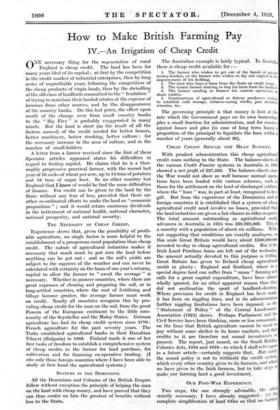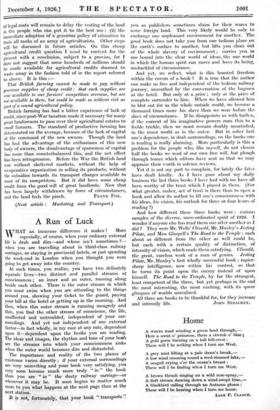How to Make British Farming Pay
IV.—An Irrigation of Cheap Credit ONE necessary thing for the regeneration of rural England is cheap credit. The land has been for many years bled of its capital ; at first by the competition in the credit market of industrial enterprises, then by long series of unprofitable years following the competition of the cheap products of virgin lands, then by the dwindling of the old class of landlords committed to the " feudalism " of trying to maintain their landed estates at the expense of incomes from other sources, and by the disappearance of the country banks. On this last point, the effect upon credit of the change over from small country banks to the " Big Five " is probably exaggerated in many minds. But the land is short (as the result of all the factors named) of the credit needed for better houses, better machinery, better stocking, better culture : for the necessary increase in the area of culture, and in the number of small-holders.
A letter from a farmer received since the first of these Spectator articles appeared states his difficulties in regard to finding capital. He claims that he is a thor- oughly progressive practical farmer, with the record last year of 16 sacks of wheat per acre, up to 14 tons of potatoes and 18 tons of sugar beet. In no other country but England that I know of would he find the same difficulties of finance. For credit can be given to the land by the State without any fear of loss, provided that there are other co-ordinated efforts to make the land an " economic proposition " ; and it would return enormous dividends in the betterment of national health, national character, national prosperity, and national security.
THE NECESSITY OF CHEAP CREDIT.
Experience shows that, given the possibility of profit- able agriculture, no single factor is more helpful to the establishment of a prosperous rural population than cheap credit. The nature of agricultural industries makes it necessary that much must be put into the land before anything can be got out : and as the soil's yields are subject to the caprices of the weather and can never be calculated with certainty on the basis of one year's returns, capital to allow the farmer to " await the average " is necessary. Whether in pioneer countries, where there are great expenses of clearing and preparing the soil, or in long-settled countries, where the cost of fertilizing and tillage become greater, the average farmer must work on credit. Nearly all countries recognize this by pro- viding cheap credit for the man on the soil, from the great Powers of the European continent to the little com- munity of the Seychelles and the Malay States. German agriculture has had its cheap credit system since 1770: French agriculture for the past seventy years. The Turks established agricultural banks in their Danubian Vilayet (Bulgaria) in 1868. Finland made it one of her first tasks of freedom to establish a comprehensive system of cheap credits to the farmer for land purchase, for cultivation and for financing co-operative trading. (I cite only those foreign countries where I have been able to study at first' hand the agricultural systems.).
SYSTEMS IN THE DOMINIONS.
All the Dominions and Colonies of the British Empire follow without exeeption the principle of helping the man on the land with cheap money, and have proved that they can thus confer on him the greatest of benefits without loss to the State. The Australian example is fairly typical. In Australi& there is cheap credit available for
1.
The farmer who wishes to get out of the hands of private money-lenders, or the farmer who wishes to lay out capital in the improvement of his holding. 2. The man who buys a farm from the State on credit terms.
3. The tenant farmer desiring to buy his farm from his landlord:
4. The farmer needing to finance his current operations on short credits.
5. Combinations of agricultural or fishery producers wishing to establish cold storage, tobacco-curing works, jam factories, wineries, &c.
The governing principle is that money is lent at the rate which the Government pays on its own borrowings plus a small fraction for administration, and for reserves against • losses and plus (in case of long term loans) a proportion of the principal to liquidate the loan within a, number of years (generally about 80).
CHEAP CREDIT SHOULD NOT MEAN Sunsiny.
With prudent administration this cheap agricultural credit costs nothing to the State. The balance-sheets of the various Credit Fancier systems in Australia in 1911 showed a net profit of £27,233. The balance-sheets since the War would • not show so well because normal opera. tions have been loaded with various schemes, such as those for the settlement on the land of discharged soldiers, where the " loan " was, in part at least, recognized to be a gift. But from the experience of the Dominions and of foreign countries it is established that .a system of cheap agricultural credit need involve no losses, provided that the land industries are given a fair chance in other respects. The total amount outstanding as agricultural credit advances in Australia in 1924 was £66,262,000. This in a country with a population of about six millions, With. out suggesting that conditions are exactly analogous, on this scale Great Britain would have about £500,000,000 invested to-day in cheap agricultural credits. But if the Irish Land Purchase loans are left out of the reckoning, the amount actually devoted to. this purpose is trifling. Great Britain has given to Ireland cheap agricultural credit in plenty : England. and Scotland, where in a special degree land can suffer from " mean " farming and calls for a great capital expenditure, have been almost wholly ignored, for no other apparent reason than they did not acclimatize the sport of landlord-shooting. Where provision for credit in England has been made, it has been on niggling lines, and in its administration further niggling limitations have been imposed, as the " Statement of Policy," of the _ Central Landowners' Association (1925) shows. Perhaps Parliament and the Civil Service have been thinking, more or less consciously, on the lines that British agriculture cannot be made to pay without some shelter in its home markets, and that credits to it ,are therefore not sound investments at present. The report, just issued, on the Small Holding Colonies Acts,. 1916 and 1918—to which I shall refer again in a future artiele—certainly suggests that. But surely the sound policy is not to withhold the credit system, which every other country gives to its farmers, and which we have given to the Irish farmers, but to take steps to make our farming land a good investment.
OUR POST-WAR EXPERIENCE.
Two steps, the one strongly advisable, the other strictly necessary, I have already suggested : (1) the complete simplification bf land titles so that no barriers of legal costs will remain to delay the vesting of the land in the people who can put it to the best use ; (2) the immediate adoption of a generous policy of education to train all ranks of an army of agriculturists. Other steps will be discussed in future articles. On this cheap agricultural credit question I must be content for the present with a conclusion, subject to a proviso, for I dare not suggest that some hundreds of millions should be made available for agricultural credits doomed to waste away in the fashion told of in the report referred to above. It is this :- That British farming cannot be made to pay without 'generous supplies of cheap credit : that such supplies are now available to our farmers' competitors overseas, but are not available to them, but could be made so without risk as part of a sound agricultural policy.
British farming has had a bitter experience of lack of credit, since post-War taxation made it necessary for many great landowners to pass over their agricultural estates to small farmers. The standard of productive farming has deteriorated on the average, because of the lack of capital at the command of the new owners. Though the land has had the advantage of the enthusiasm of this new body of owners, the disadvantage of sparseness of capital has more than counterbalanced this, and the net effect has been retrogression. Before the War the British land was without sheltered markets, without the help of co-operative organization in selling its products, without the subsidies towards its transport charges available to most of its competitors. But it did have some cheap credit from the good will of great landlords. Now that has been largely withdrawn by force of circumstances, and the land feels the pinch. FRANK Fox.
(Next article : Marketing and Transport.)































































 Previous page
Previous page